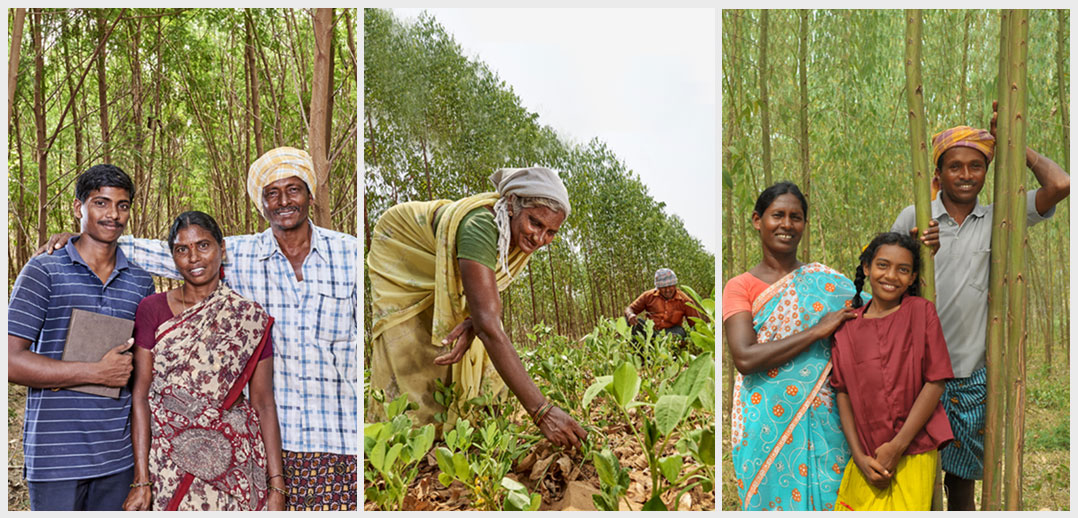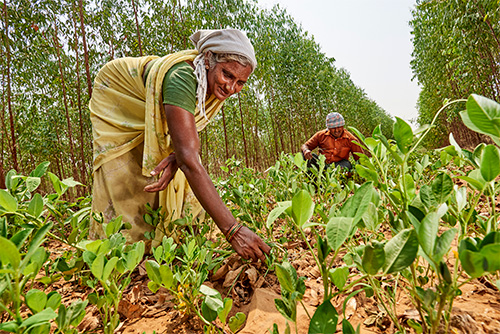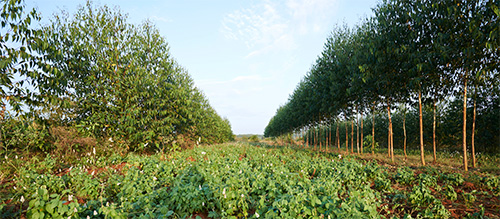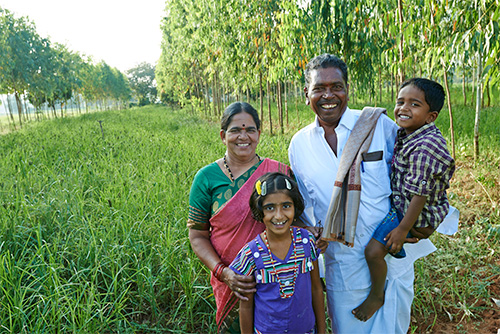
Degradation of land affect people who directly depend on natural resources for subsistence, food security, and income. Integration of forests into agricultural and rural landscapes not only makes significant contributions to ecological balance and rural livelihoods but also enhances overall socio-economic development. As a responsible corporate citizen committed to building a climate-positive enterprise, ITC's forestry initiatives demonstrate a unique blend of supporting livelihoods and ecological sustainability.
ITC's forestry initiatives blend multi-layered objectives effectively - enhancing farmers' income, expansion of carbon sequestration, making agricultural lands more productive, and, above all, increasing the green cover in India. To achieve these objectives, ITC has accelerated its Social, Farm, and Agro Forestry initiatives.
Social Forestry - ITC implemented Social Forestry targeting poor wasteland owners -providing them with the means to turn their wastelands into a sustainable livelihood opportunity and an income-generating asset. The model addresses the obstacle faced by marginal wasteland owners by providing clonal saplings developed by ITC at subsidised rates and financial assistance in the form of long-term, interest-free loans. This helps the marginal farmers to invest in their unproductive landholdings. ITC also provides support like technical, training, etc. through Social Forestry Groups, which enable marginalised communities to pool resources and collaborate for social and economic advantage.
ITC also helps farmers in getting plantations certified under Forest Stewardship Council Certification (FSC) which ensures sustainable cultivation & provides premium for their wood. By providing alternative livelihood options and diversification, ITC's Social Forestry helps to reduce the vulnerability of marginal farmers to climate change, market fluctuations, and other socio-economic shocks. Additionally, it contributes to carbon sequestration, water conservation, and overall ecological integrity.

Agro Forestry: Integral to the Social Forestry programme is the Agro-Forestry initiative including plantations on bunds. It is an integrated land-use system in which crops and pulpwood saplings are grown on the same plot of land in a specific spacing pattern so that wood productivity is not affected. The wider spacing of plantations allows agricultural crops to be grown throughout the four-year cycle. Under this model, the land allocation to forestry is 25% and the remaining 75% of land is available for agricultural crops.
As part of the 'bund plantation' in the agro-forestry model, pulpwood trees are raised on farm bunds or boundaries of the farm fields for value addition in farm income without affecting the productivity of agricultural crops. Bund plantations are promoted especially on the bunds of paddy fields or any other agricultural farm that has an irrigation facility and the farmer is not interested to convert his farm into a plantation.

The integration of trees in agricultural systems through Agro Forestry enhances farm productivity and profitability and improves rural livelihoods while conserving the environment, and bringing diversification to farmlands. The programme is a win-win model for the farmers as it helps them to earn an annual income through the inter-crops and a lump-sum amount every 4 years through the pulpwood trees. Cultivation of trees and crops together not only ensures better incomes for farmers but also contributes to the food and wood security of the nation.

Farm Forestry: ITC's Farm Forestry model helps medium to large farmers with over 5 acres of degraded agricultural land to convert their wastelands into pulpwood plantations, thus providing them with a viable alternative land-use option. The model involves strategic planting of trees so that a farmer can raise an inter-crop in the first year and from the second year onwards, shade-loving crops can be raised in block plantations.
Under this programme, ITC supplies high-quality clonal saplings to farmers, and provides extensive support on the know-how of best management practices like efficient inter-cropping, protecting plants from insect/pest attacks, soil nutrient management, weed management, and logging. ITC also provides the farmers with a buy-back guarantee of the wood at the prevailing market rates when a tree matures. However, the farmers are also free to sell the wood to any other party as well.
The hardiness and productivity of ITC's clonal saplings, backed by the Company's comprehensive extension services all contributed to Farm Forestry finding ready acceptance. Additionally, converting an idle asset into one that generates significant income made this an attractive proposition for farmers owning wastelands.
Both Social and Farm Forestry provide a sizeable, scalable, cost-effective, and renewable raw material base for ITC's Paperboards & Specialty Papers Division (PSPD) and are vital to the Division's long-term international competitiveness and sustainability.
ITC's Farm and Social forestry programmes have together greened over 11.73 lakh acres till date enabling higher returns to farmers and diversification of farm portfolios of marginal farmers and rural households. The programmes have generated about 174 million-person days of employment for rural households, including women, poor tribal and marginal farmers. The initiatives have resulted in GHG removal of 5,993,040 tonnes of CO2.
As part of its bold Sustainability 2.0 goal, ITC will sustain and enhance carbon sequestration by expanding forestry projects on wastelands through its Social and Farm Forestry programmes and other such initiatives. Its target is to cover 1,500,000 acres by 2030.